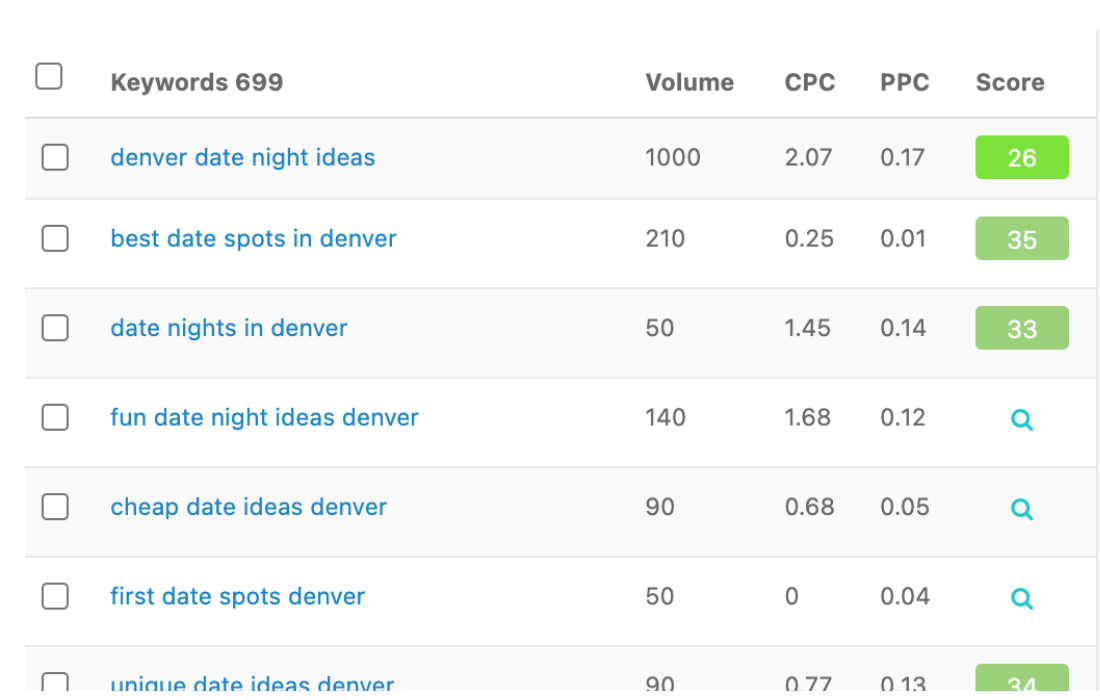This article has links to products and services we love, which we may make commission from.
SEO for bloggers is not as scary or technical as it sounds. With over 1 trillion searches performed every month on search engines like Google, it’s worth setting aside a few days to learn it!
Have you been wishing your blog’s audience would grow and you could get more traffic? I’ll tell you something. That can happen and it’s not magic. The key is to start ranking on the first page of Google, so more people are seeing your blog and your content.
This is what we call SEO or search engine optimization.
Being in the first three results, or even just the first page, gives your site more authority and visibility, more click-throughs, and a larger potential audience.
But you won’t just land there by chance. It takes good SEO to get and to stay there.

By the end of this post you will be able to
- Identify what is needed to write great content.
- Understand the importance of keywords.
- Speak Google’s language (it’s not that technical!)
The 5 Most Important SEO Techniques Bloggers Should Be Using
In order to have the best shot at ranking on the first page, you need to set yourself up with an SEO strategy that works.
Today, I’m going to share with you the most important SEO techniques you should absolutely be using if you want to start building your audience and gaining more traffic.
Keep in mind that one step without the other is not a strategy. You need them all to be truly successful.
Here are the main techniques that ensure your site and your content are completely optimized for search engines.
#1: Create Great Content
Above anything else, Google wants great content.
Google, and the other search engines, spend massive amounts of time perfecting their algorithms that help them determine the best content to rank at the top of their results.
A large part of this algorithm is based on finding the very best content.
There have made many updates throughout the years to perfect their way of finding that content.
But one thing remains constant. If you don’t have great content, you won’t rank at the top.
You probably know this already, but writing 300 words about your experience with some photo thrown in isn’t going to cut it anymore.
In order to truly compete for the top three search results, you need to:
- Thoroughly solve the reader’s problem/query.
- Provide incredible value to the reader.
- Do it better than the competition.
- Avoid typos, grammar mistakes, and misinformation.
- Be an authority on the topic – it is better to write in depth about a few than thinly about lots.
- As well as authority, you need to show you experience, expertise, and trustworthiness (EEAT).

#2: Find And Use Killer Keywords
Have you ever wondered why more people aren’t reading your content?
Or more importantly, why you can’t seem to increase your monthly page views?
It’s likely because you aren’t optimizing your site, or your posts, with rankable keywords.
Keywords are one of the most important aspects of search engine optimization, and are very important to your success.
If you devote time to just one aspect of SEO, it should be researching and using the right keywords.
In fact, you should not start writing a single word without knowing the keywords you want to try to rank for.
If you’re really serious about writing content that ranks, you should even research your keywords before planning your trip.
Why, you ask?
Because writing content no one is looking for is a waste of time.
It is the main reason more people aren’t reading your content.
In order to gain more views for your posts, you have to write content people are searching for, and you have to let Google know you have it.
You’re going to do that by
- Researching keywords that have a decent search volume with low competition.
- Using those target keywords to plan and write a high-quality, useful and authoritative post.
- Including other relevant keywords to thoroughly answer user intent which means, the content the reader is looking for.
- Read more about finding and using the best target keywords here.
We use Keysearch (screenshot below) to find killer keywords.
It’s not free but a keyword research tool is something you will want to invest in and you won’t think twice about spending the money on it because you will use it every day.

#3: Integrate On-page SEO Signals Into Your Content
On-page SEO refers to all of the practices used to improve your website – both its content and the user experience.
Optimizing content for on-page SEO requires adding specific ranking signals that act as indicators to the search engine algorithm.
If you go without implementing any SEO signals on your site, you are not optimizing your site for search engines, and will lose out on a lot of traffic that could potentially come your way.
How does this work?
Well, Google’s search spiders crawl around your site looking for indicators of your content.
They look for keywords and the placement of those words, they look at what your content links to both internally and externally, and they look at your title and meta description.
These things all give them more info that they can use to determine what your content is about and how to rank it in the search results.
If you’ve got all the things they’re looking for, you’ll inevitably rank higher.
If you don’t have those things, you’re leaving it up to chance.

#4: Improve Your Backlink Profile
Off-Page SEO refers to the things you do to optimize your brand outside of your website.
If done well, off-site SEO will boost brand awareness and cast your site in a positive light that will also translate into positive signals to the search engines, more organic mentions of your site by others, and more authority.
Off-site SEO includes a lot of different aspects, the most important are said to be link building, building and monitoring your brand, and social media.
All three converge to create a solid SEO strategy.
Many bloggers focus a lot of their time on building backlinks.
To improve your backlink profile, you need to do two things:
- One is to check and monitor your backlink profile, which you can do in the Google Search Console.
- The second is to put some effort into building backlinks.
You can build backlinks through a number of methods including interviews, guest posting and creating infographics.
Facebook groups are a way to find and network with other like-minded bloggers.
Once you’ve established a relationship, you can see if any of them are open to collaboration.
When you start to rank on Google with your incredibly useful content, you find that sites link back to your posts naturally.

#5: Adjust the Technical Aspects of Your Site
This is the part that most bloggers dread, especially if you don’t have a great understanding of how the technical side of your website works.
You might need to hire a contractor to help you with the technical aspects of your site that affect SEO.
The last thing you want to do is tackle every other technique, but ignore this one.
Technical issues can be a major reason why your site is having a difficult time ranking well.
Without addressing certain issues, you can’t build a solid foundation to give your blog the best chance to rank for relevant keywords.
There are many factors that play a role in technical SEO.
But if you have to direct your efforts in the most opportune way, you should focus on these five, as a basic starting point to building a solid foundation for your blog.
- Sitemap Optimization
- Page Speed.
- Mobile-Friendly Layout.
- Site Security.
If you can manage to take care of these four major issues, you’ll stand a much better chance to being ranked well in the search engines, because all of these aspects affect the user experience of your site.
If you can’t face working on the technical side of your site, consider contracting an expert such as Alison Donneallan’s services
About the Authors
Gemma is the owner of a number of travel and lifestyle websites including Two Scots Abroad Travel Guides. Laura runs a portfolio of travel, food, and lifestyle sites. They both love to travel, drink wine, and increasing their website traffic through SEO!

